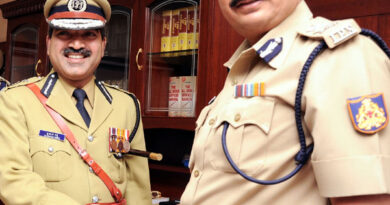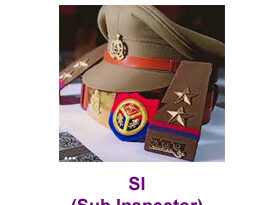RAILWAY PROTECTION FORCE (RPF) Minimum Age 18
RAILWAY PROTECTION FORCE (RPF) Minimum Age 18 Short title, scope and introduction.Definitions.
Constitution of the Association.
Appointment and powers of senior officials.
[Released.]
Appointment of members of the Association.
Certificates to members of the Armed Forces.
Command and administration of the Army.
Dismissal, dismissal, etc., of members of an association.
Officers and members of the Association shall be deemed to be railway employees.
Duties of members of the Association.
Power to bind without permission.
Power search without warranty.
Procedure to be followed after arrest.
Officers and members of the Association shall be deemed to be permanent in office and responsible for appointment
any part of trains.
15A. Restrictions relating to the right to assemble the Form, etc.
Responsibilities of members of the Association at the time of appointment.
16A. Awarding of certificates, weapons, etc., by persons who cease to be members of the Society.
Penalties for negligence, etc.
Application of Act 22 of 1922 to members of the Society.
Certain rules shall not apply to members of the Association.
Protection of the actions of members of the Association.
Schedule of RAILWAY PROTECTION FORCE (RPF) age 18

Power to make laws.
SCHEDULE
Short title, scope and commencement—— (1) This Act may be called the Train Protection
Force Act, 1957.
(2) It spreads throughout India.
(3) It shall come into operation on that day3
as the Central Government may do, by notice in
Official Gazette, appoint. Definitions. —
[(1)] In this Act, unless the context otherwise requires, –
(a) “Powers” means the Railway Protection Authority established under section 3;
[(b) “Director-General” means the Director-General of the Army appointed under subsection (1).
section 4;
(ba) “registered member of the Association” means any subordinate officer, subordinate to another officer
a member of the lower ranks Association;
(bb) “Forcible detention” means the detention or detention of a member of the Association in conjunction
by rules made under this Act;]
(c) “member of the Army” means a person appointed to the Service under this Act 6
[(ca) “passenger” shall have the meaning assigned to him or her in the Railways Act, 1989 (24 of 1989);
(cb) “passenger terminal” shall include a railway station, train, yard and any other available space
often visited by passengers;]
(d) “prescribed” means prescribed by rules made under this Act;
(e) “railway goods” includes any goods, money or securities, or an animal, belonging to,
or carrying or carrying, rail management;
[(ea) “subordinate officer” means a person appointed to the Association as an inspector, a Sub-Inspector
or Sub-Assistant Inspector;]
Chief Executive Officer ”means any officers appointed under section 4 and includes any other
an official designated by the Central Government as the chief executive of the army;
[(fa) “subordinate official” means a person appointed to the Service as the Chief Constable or Naik;]
(g) words and expressions used but not defined in this Act and defined in the Indian Railways
The Act, 1890 (9 of 1890), shall have the meanings assigned to it in terms of that Act.
[(2) Any of this action refers to the law which does not apply to any place in respect of that area,
taken as a reference to the corresponding law, if any, applicable to that place.]Constitution of the Armed Forces .— (1) It shall be formed and maintained by the Central Head
Government a2
[Union armed forces] to be called the Railway Protection Force for the better
protection and security of railway equipment.
(2) The power to be constructed thus shall have that number
of 3
[senior subordinates, subordinates and other registered members] of the Army as well
will receive that salary and other rewriting as may be determined.
Appointment and power of high officials. — 4
[(1) The Central Government may appoint a
a person who will be the Director-General of the Armed Forces and may appoint other persons to serve as Inspector-General,
Additional Auditor-General, Deputy Auditor-General, Assistant Auditor-General, Senior
Commanders, Commanders or Assistant Officers of the Army.]
(2) 5
[The Director-General] and all other senior executives appointed shall have the authority to act
such powers and authority over the members of the Association under its laws as provided
by or under this Act.
[Categories and standards among members of the Association.] – Abandoned by Railway Protection Agency
(Amendment) Act, 1985 (60 of 1985), is. 6 (w.e.f. 20-9-1985).
6
[6. Appointment of members of the Society. — Appointment of registered members of the Society
will sit with the Auditor-General, the additional Auditor-General or the Deputy Auditor-General who stated
will exercise that power in accordance with the rules made under this Act:
Provided that the power of appointment under this category may be exercised by other superiors
an officer such as the Auditor-General, the Auditor-General or the Deputy Deputy Auditor-General concerned
may, by order, clarify this.]
Certificates to members of the Army .— (1) Every member of the Association shall receive his or her own
designate the certificate in the manner specified in the Schedule, under the mark 7
[Inspector-General,
Additional Auditor-General or Deputy Auditor-General] or other senior official such as
a
7
[Auditor-General, Additional Auditor-General or Deputy Auditor-General] may specify this
in the name of the person holding the certificate shall be empowered by the member
Power
to protect and protect railway equipment, passenger and passenger terminals;
(c) remove any obstacle to the movement of the railway line or passenger compartment; and
(d) committing any other act in connection with the better protection and security of the railway area;
passenger and passenger seat.]

Power to arrest without permission. — Any member of the Association, without an order from aMagistrate and without permission, arrest—
(i) any person who intentionally injures, or attempts to intentionally injure, or
prevents or improperly attempts to seize, or attack, threaten to strike, or use, or
threatens or attempts to use criminal force against him or any other member of the Society in his or her assassination
of his or her duties as a member of the body, either with the intent to obstruct or hinder him or her from performing his or her duties
that member, or for any other lawful act or attempt
to fulfill his or her role as a member; or
(ii) any person who has been involved in, or has a reasonable suspicion of,
anxious, or who is found taking security measures to hide his or her presence below
situations that give reason to believe that you are taking these safety precautions for this purpose
to make a visible case related to 2
[train station, passenger and passenger area];
or
(iii) any person found taking security measures to conceal his or her presence within the railway line
situations that give reason to believe that you are taking these safety precautions for this purpose
stealing, or harming, 2
[train station, passenger and passenger area]; or
(iv) any person who commits or attempts to commit an apparent offense involving or
which may involve an imminent danger to the health of any person performing any other function
corresponding to 2
[train station, passenger and passenger area]. Power to search without permission.— (1) Anytime 3
- * * any member of the Association, not below
the position of Senior Rakshak, has reason to believe that any such case as referred to in section 12.
made or done and a search warrant will not be available without payment
the offender has the opportunity to evade or conceal evidence of a crime, and may be remanded in custody
seek out the person and his property immediately and, if he or she deems it appropriate, arrest any person who has a reason
believing you have committed a crime.
(2) Provisions 4
[Criminal Procedure Code, 1973 (2 of 1974)], relating to search under
that Code will apply, to date, in searches under this section.Procedure to be followed after incarceration. — Any 5
a member of the Society bound under
under this Act, without unnecessary delay, take the person arrested 6
[to the police
and a detailed report of the circumstances leading to the arrest of those persons], or
in the absence of a police officer, take that person or have them taken to the nearest police station. - Officers and members of the Association shall be permanently employed and are responsible for their duties
are used in any part of the train. — 7
[(1) All members of the Association must, for the purposes of this
The Act, is deemed to be in force, and, at any time, shall be liable for employment elsewhere.
within India. 
The Central Government, by notice in the Official Gazette,
to make laws for the purposes of this Act.
In particular, and without prejudice to the general nature of the above powers, such rules may be
provide—
(a) governing classes and grades and pay and salary 1
*** Members of the Association
and their working conditions in the Association;
(b) regulating the powers and functions 1
*** Members of the Association are authorized to use any
functions under or under this Act;
(c) adjusting working hours 1
*** Members of the Association;
[(d) prescribing the definition and quality of weapons, allotments, uniforms and other requirements
items to be given to members of the Association;
(e) determining the accommodation of a member of the Association;
(f) the establishment, management and control of any fund for any related purpose
Army management;
(g) regulating the penalties and the decision-making authorities
instructions for punishment, or for the release of fines, or other penalties and the procedure to be followed
dismissal of such complaints;
(h) regulates matters relating to enforcement under this Act, including the procedure to be followed
followed by the detention of people in such a cell;
(i) to regulate matters relating to the dismissal of offenses relating to offenses under this Act and
specifying the places where a person convicted of an offense under this Act may be detained;
(j) any other matter which must be, or may be, or in accordance with applicable laws
to be performed under this Act.]
Every law made under this Act shall be laid down, as soon as practicable, after the enactment, before each other.
The House of Representatives, while still in office, for a period of thirty days may be incorporated
one or two or more consecutive sessions, and if, before the end of the session immediately
following the session or consecutive sessions mentioned above, both Houses agree to make any modifications
in law or both Houses agree that the law should not be enacted, the law after that will only apply
in that form which has been modified or invalid, as it may be; so, however, that any such conversion or
the dismissal shall be without prejudice to the legitimacy of any activity previously performed under that law


